Ann Martin - Jessi's Wish
Здесь есть возможность читать онлайн «Ann Martin - Jessi's Wish» весь текст электронной книги совершенно бесплатно (целиком полную версию без сокращений). В некоторых случаях можно слушать аудио, скачать через торрент в формате fb2 и присутствует краткое содержание. Жанр: Старинная литература, на английском языке. Описание произведения, (предисловие) а так же отзывы посетителей доступны на портале библиотеки ЛибКат.
- Название:Jessi's Wish
- Автор:
- Жанр:
- Год:неизвестен
- ISBN:нет данных
- Рейтинг книги:5 / 5. Голосов: 1
-
Избранное:Добавить в избранное
- Отзывы:
-
Ваша оценка:
- 100
- 1
- 2
- 3
- 4
- 5
Jessi's Wish: краткое содержание, описание и аннотация
Предлагаем к чтению аннотацию, описание, краткое содержание или предисловие (зависит от того, что написал сам автор книги «Jessi's Wish»). Если вы не нашли необходимую информацию о книге — напишите в комментариях, мы постараемся отыскать её.
Jessi's Wish — читать онлайн бесплатно полную книгу (весь текст) целиком
Ниже представлен текст книги, разбитый по страницам. Система сохранения места последней прочитанной страницы, позволяет с удобством читать онлайн бесплатно книгу «Jessi's Wish», без необходимости каждый раз заново искать на чём Вы остановились. Поставьте закладку, и сможете в любой момент перейти на страницу, на которой закончили чтение.
Интервал:
Закладка:
Chapter 12.
Dawn's afternoons at the Baker Institute for physically disabled kids sounded fascinating. She rode to Stamford in a specially equipped van with four children from Stoneybrook who went to Baker for physical therapy, classes in the arts, and a chance to make new friends. The bus driver was a woman who was going to college to learn to be a physical therapist. She drove the bus to earn some extra money, but the kids were more than just a job to her. She really enjoyed being with them.
"Candace is so funny," Dawn told me. "She jokes around with the kids, and they love her. She treats all of them the way you'd treat kids who aren't in wheelchairs or wearing braces. She'll say to them, 'Hurry up! I haven't got all day,' and the kids just giggle. Most people tiptoe around the kids like they're going to break. And never mention their braces or anything. But if a friend of yours got new clothes, you'd make a comment, right? So if a kid gets on the bus with decorations all over the back of his wheelchair, Candace will say, 'Your chair looks great today! I think you should go into business as a decorator.' "
Anyway, when the bus arrived at Baker, Dawn and Candace would help the kids inside. The kids and teachers and therapists would gather in this one huge room and talk.
Dawn usually looked around for Kendra. Or Kendra found Dawn.
"Dawn! Yo, Dawn!" -Kendra called one afternoon.
Dawn started laughing. She turned around and saw Kendra zipping toward her in her motdrized wheelchair.
"What's this 'Yo, Dawn'?" Dawn teased. "What ever happened to 'Good afternoon, Dawn. Nice to see you'?"
"My big brother says 'yo' all the time," replied Kendra. "He even answers the phone that way. He picks it up and he says, 'Yo, the Bogdanoffs'. Who's this?' "
"And what do your parents think of that?" asked Dawn.
"They don't know he does it." Kendra grinned.
Kendra is nine years old. She has cerebral palsy. Her muscles don't work the way most people's muscles do. Her legs don't support her, so she can't stand or walk. And she doesn't have much control over her arms. That's why her wheelchair is motorized. She can steer it just by moving these buttons. She doesn't have to push the wheels along.
When Dawn told me that, I said, "If she doesn't have good muscle control, how can she do anything? You need muscles to write . . . even to see."
"Well, she has better control over some of her muscles than others," Dawn replied. "Also, she uses a computer. It's much easier for her just to hit keys than it is for her to write. Although she can write. She can see, too, but she really has to concentrate in order to read. Even so, she reads a lot, which only goes to show how much she enjoys it."
Kendra was always writing something. She really did plan to be an author one day. She was good at writing, and she was proud of her work.
"Look what I wrote last night," Kendra said to Dawn. Slowly she reached into the tote bag that hung from the side of her chair. She pulled out a piece of paper and held it toward Dawn.
Dawn reached for it. " 'Why I Hate Tomatoes/ " she read aloud. She laughed. "Was this a school assignment?"
"No. My mom made me eat a tomato last night, even though I hate them."
"So you decided to write about that?"
"Yup. My favorite part of my story — well, I guess it's really more of an essay — is the time I bit into one of those little cherry tomatoes?" (Dawn nodded.) "And I squished it between my teeth and the seeds shot all the way across the table and hit my mother in the face. I thought she would say, 'Okay, Kendra.
No more tomatoes.' But she didn't. Someday I think I'll write a book about tomatoes. I'll call it My War Against Tomatoes, the Most Disgusting Food There Is. ... Hey, there's Polly. Yo, Polly! Wait for me!"
I couldn't help thinking, when Dawn told me the story, that Kendra was actually luckier than Danielle. I knew I shouldn't compare the girls. I knew there was no point in it. But I couldn't help it. I'm sure both Danielle and Kendra would have thought I was crazy. I mean, take Danielle. Her muscles work fine. She can walk and run and chase after Mr. Toes. She doesn't have to concentrate extra hard to read. If she wants to write a quick note, she just picks up a pencil and a piece of paper. If she wants to make a phone call, she picks up the phone and dials it. When the phone rings, she runs to the kitchen and answers it. All very easy for her.
But.
But when Danielle thinks of the future, she thinks of fifth grade, maybe sixth grade. She wishes to be able to graduate from Stoney-brook Elementary. When Kendra thinks of the future, she thinks of college, of being an adult, of becoming a writer. Kendra has a future. Danielle has a future, too, of course, but hers is much more uncertain.
When the last bus had arrived at Baker, one
teacher took a head count of the kids who had shown up. Then the others guided their students to various areas. One small group went to an art class for extremely disabled kids, another to an art class for more mobile kids, another to physical therapy, etc. Dawn had decided to help in a writing class for fairly mobile students. Kendra was a member of that class.
Into a small room rolled Kendra and six other kids. Four of Kendra's friends rode in motorized wheelchairs. The other two pushed themselves in manual chairs, using strong arms. They positioned themselves in front of computers. Kendra was grinning.
"Today's subject," began Mr. Arno, the writing teacher, "is humor. I want you to write a humorous story, and I want you to tell your story in dialogue."
"Just dialogue?" asked a boy.
"Just dialogue," replied Mr. Arno.
"Oh, boy!" said Kendra softly. "This is going to be fun."
For the next half hour, Dawn helped the kids with their assignment. Blaire, who's a year older than Kendra, had a lot of questions — and used a voice synthesizer to ask them. Like Kendra, she has cerebral palsy, except that the muscles that control her speech are affected, so she has to communicate by
writing or by using her computer. Mickey, who has muscular dystrophy, wrote quickly, his fingers flying over the keys.
"Our champ," said Mr. Arno, smiling. "He took a typing class."
Mickey had begun to develop muscular dystrophy just a couple of years earlier. So far, his legs were affected, but not his arms.
"However," Mr. Arno had told Dawn one day, "muscular dystrophy is a progressive disease."
"Progressive?" Dawn repeated, watching Mickey.
"Meaning it keeps getting worse."
"Oh." Dawn nodded her head soberly.
That was when I'd realized how silly it was for me to compare children. What was the point of wondering why Danielle had gotten leukemia instead of cerebral palsy? Or why Mickey had gotten muscular dystrophy instead of leukemia? If he'd gotten leukemia, he would still be able to use his legs. But then, he would have been so sick. . . .
Life is not fair, I had reminded myself. Everybody gets a bad break from time to time. The important thing is not what those breaks are, but how you deal with them. If I ever got as sick as Danielle, I hoped I could also be as cheerful and funny and realistic as she was.
I admired Danielle's special brand of hope.
And Dawn admired Kendra's optimism.
"Hey, Dawn," said Kendra, looking up from the computer. "How do you spell 'yo'?"
Dawn laughed. "Y-O," she replied.
"Oh. Just like it sounds. All right." Kendra tapped away at her keyboard. Five minutes later, she said, "Done!" Then she added, "Someday this story is going to be published!"
Ill
Chapter 13.
"The kids are going to be off the wall today," Mr. Katz warned me. But he didn't look terribly concerned. In fact, he was smiling.
Mr. Katz and I were getting ready for a Kids Club meeting. I had passed my four-meeting trial and was now the permanent temporary assistant. I would be helping with the club for a few more weeks — until Ms..Simon came back. She had phoned Mr. Katz several days earlier to announce her upcoming return. I would be helping for longer than I had originally planned, but Kristy didn't care.
Читать дальшеИнтервал:
Закладка:
Похожие книги на «Jessi's Wish»
Представляем Вашему вниманию похожие книги на «Jessi's Wish» списком для выбора. Мы отобрали схожую по названию и смыслу литературу в надежде предоставить читателям больше вариантов отыскать новые, интересные, ещё непрочитанные произведения.
Обсуждение, отзывы о книге «Jessi's Wish» и просто собственные мнения читателей. Оставьте ваши комментарии, напишите, что Вы думаете о произведении, его смысле или главных героях. Укажите что конкретно понравилось, а что нет, и почему Вы так считаете.
